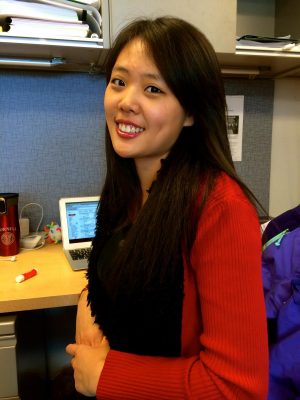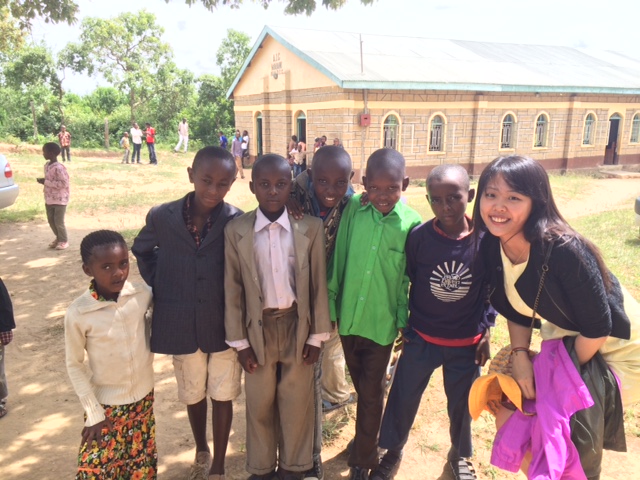Student Spotlight: Jiai Zhang

What is your area of research?
My area of research is food science, focusing on dairy chemistry and processing, with a minor in marketing. My research is to develop a novel snack made of milk and soy protein for the Asian market and to study how critical processing parameters affect the final product.
What inspired you to choose this field of study?
Everybody has to eat and humans cannot live without food. However, food security and safety are still big concerns in the world, especially in developing countries. It is exciting for me to develop new, high-quality food products to respond to preferences and food production capabilities of different populations, and thus help feed the world. My career goal is to apply the knowledge I gained in my studies to improve people’s quality of life.
Why is this research important?
In the Asian market, the acceptance of soy products is high, while the acceptance of dairy products (such as milk and cheese) is relatively low due to sensory properties and lactose-intolerance among consumers. To take advantage of the health benefits of dairy products, some Asian food manufacturers are trying to incorporate dairy components into food products—in this case by creating a dairy-soy based product. Since soy and milk proteins have different structure and properties, a study on how to obtain dairy-soy mixtures of desired structural and physicochemical properties is necessary.
How has your background influenced your scholarship?
I studied food science for my undergraduate because of my strong interest in this field. I got my Bachelor of Science degree from Purdue University. Four years of training at Purdue followed by one year of MPS studies at Cornell gave me a solid background and well-rounded understanding of food science. This project also tapped into my interest in connecting science and business to help companies be profitable. Moreover, since I am from China and I am familiar with the Chinese market and Chinese consumers, I can facilitate a smooth communication between the U.S. and Chinese partners in this project.
What else has influenced your thinking as a researcher or scholar?
The demands of an ever-evolving world have shaped my thinking as a researcher. To keep the world moving forward, we always need to come up with new ideas and then apply them. Also, these new ideas should be aligned with the realities of production in terms of labor, capital, and facilities. Therefore, I feel very motivated to understand and become able to address the challenges that arise from these demands.
You recently traveled to Kenya on a travel grant from the Graduate School. How was your experience there?
My experience in Kenya was very meaningful. As a team of four members, we developed strategic plans for the biggest local agro-dealer (a retailer selling agricultural products) to move forward. My role was to streamline the marketing strategy for the company by market penetration, and to promote agricultural development for the local government by strengthening extension services for farmers. As a result, the company spoke highly of our work after their board meeting, and they will definitely consider implementing our proposals in daily operation.
In what ways was the research you conducted on this trip vital to your scholarship?

Before departure, PEST (political, economic, social, and technological) and SWOT (strengths, weaknesses, opportunities, and threats) analyses were conducted after background reading. However, it is critical to validate the information obtained from papers and gain firsthand information on-site. Also, when in Kenya, we communicated directly with different people in government administrations, research institutions, non-governmental organizations, and consulting companies. We heard voices from all perspectives and were able to connect information and gain a more complete and accurate story from the words and gestures of the people we met.
What opportunities did the travel grant provide for you that you perhaps wouldn’t have had access to otherwise?
The research grant allowed me to travel from U.S. to Kenya, which showed me vividly how the company has been running. Without traveling to Kenya, I would have no firsthand knowledge of the country’s culture, politics, society, facilities, and farming. Without this information, I would have not been to develop a practical a feasible strategy for the company.
Any advice for other graduate students interested in applying for research travel grants?
When applying for travel grants, it is important to state clearly your purpose of travel and how you can benefit from the trip. Also, students should justify how this research is related to their interests or helpful to their career.
Why did you choose Cornell to pursue your degree?
Our food science program has a great reputation for being one of the best programs in the U.S. and in the world. Cornell food science is well known for its knowledgeable and supportive faculty members, strong industry network, laboratory, and pilot-scale facilities. Furthermore, my professor’s field is what I am interested in. I am eager to work on a topic that I care about and to use the skillset I gain in my career.
What’s next for you?
I will finish my Master of Science degree this year and I am looking for jobs in Consumer Packaged Goods (CPG) companies. I am passionate to help with scientific communication and business collaboration and thus bridge the gap between countries. My life goal is to become a peace and welfare negotiator by increasing food security and safety globally. As a food scientist, I hope to help people from all over the world have access to food and experience food both safely and enjoyably.
Interview by Sally Kral, communications and outreach assistant in the Graduate School
